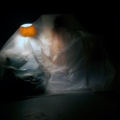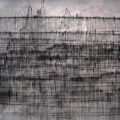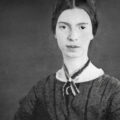From the Editors: the Motherhood Issue

We’re trying to think back to the origins of A. Bradstreet: We remember that I was working in the Poetry Room at Harvard. That I came by to drop off some letterpress posters I made, “POETS NOT PROFITS,” with a child in a stroller. That I was manning the front desk. That she told me that she had a baby, too. That we commiserated over sleep regressions. That we met a few times after that, that we went out to coffee when her daughter was so young she still used one of the infant blue-green pacifiers. That she (the baby? the mother? I?) slept the entire time we were there. That she told me, when her son was born, she translated poetry to get back to writing poetry. That she wrote about poetry to get back to writing poetry. That she recruited me for a book review on conceptual writing by women. That here I discovered models for how experiment, routine, motherhood, and literature could only strengthen each other.
She mentioned she had an idea for a website publication highlighting the intersections of motherhood and poetry (which over time expanded to parenthood, poetry, art). We met at her house, coffee shops, playgrounds and on campus over the following weeks, putting together ideas, getting our sons together, lending each other books, toys, hand-me-downs, and all the while talking and thinking about what we wanted and needed to read as mothers and as poets. And we were just two among a knot of mother-poets and translators in Cambridge at that time, a vibrant and blisteringly talented community whom we read, befriended, listened to. We met with this group (and an exceptional and welcome father-poet) at each other’s homes and in libraries, with kids and manuscripts in tow, with coffee and juice and workshopping pens on the tables. We read and discussed each other’s new work, work that we would see in future years in our libraries, bookstores, online. Our children played next to us, but they also bore witness to our poetry. And our poetry bore witness to our children.
As she and I worked at gathering essays, writing, reading, interviewing the poets we both admired, we also became friends. We learned that both of us not only shared aspects of our motherhood, our writing, but also relationships with our own mothers. That for both of us, the project of A. Bradstreet became a way to work out a cure.
Our knot of mothers, poets has since dissipated across the country and the world, such is our profession. We have been silent and resurfaced to each other (and as A. Bradstreet) in waves over the years. She moved to the Netherlands. We both changed jobs. She had another baby, a girl. We both published our first books. And we both became contributing editors at another friend’s publication, The Critical Flame. This friend has since become a father himself. And he invited us to guest-edit this issue, as he begins to know his daughter and to learn the contours of his new world of father and poet.
A. Bradstreet has always been a symbiotic effort: to gather the voices, the stories, the answers that we need to hear, that we’ve heard from many other mother-writers that they need and have had trouble locating. This, in turn, authorizes, co-authors, our own writing, and we hope that of our readers. We need each other’s words as much as we need each other. We were excited to revisit and reimagine our vision for the project we started years ago, with this motherhood-themed issue of The Critical Flame. Our gathering here includes artists alongside the poets; long-time contributors and new voices; essays on anticipation, loss, physicality, language and the literary heroes we answer to and hold sacred. There are perspectives on motherhood we were not able to cover in this issue, and we see these limitations. We wish we lived in a time and society where we could offer what each writing mother—of whichever class, race and embodiment, as well as mode of mothering—needs to have her voice heard, and we want to learn how to create a platform that offers the support and security for this. We’ve always seen A. Bradstreet, and this issue of The Critical Flame, as an invitation extended to our readers to expand and re-define what is known as “motherhood.” And for those who don’t see motherhood as anything they could imagine in themselves, we hope A. Bradstreet still can be a prompt to consider what it means, what is involved, for a woman to own her voice and to be the author of her reproductive capacities.
This issue has been a labor of love for all involved. We’re not able to offer compensation for the labor of writing, let alone the added cost of childcare. Still, miraculously, in what we can only call the spirit of maternal solidarity, our contributors have prioritized being a part of this issue over formidable parental and professional demands, and we are supremely grateful that they chose to use that incalculably precious commodity of parenthood—time—to give us their words.
Now, and onward,
Mia You & Chloe Garcia Roberts
Image: Mary Kelly, from “Post-Partum Document”
About A. Bradstreet
A. BRADSTREET is a forum on reading motherhood, taking poetics as the form of its praxis. A. BRADSTREET, faced with what might be called the most common of experiences, finds herself seeking the particular solace and solidarity of poetry. A. BRADSTREET looks directly at the maternal mind in the poem, and at the poetic mind in the mother, and affirms, “Yes, I know you are there.”





